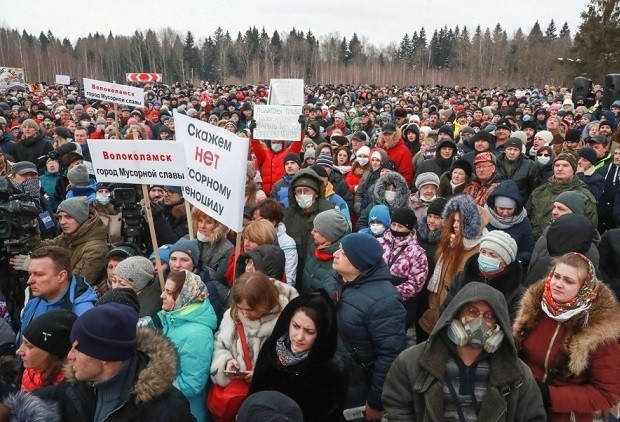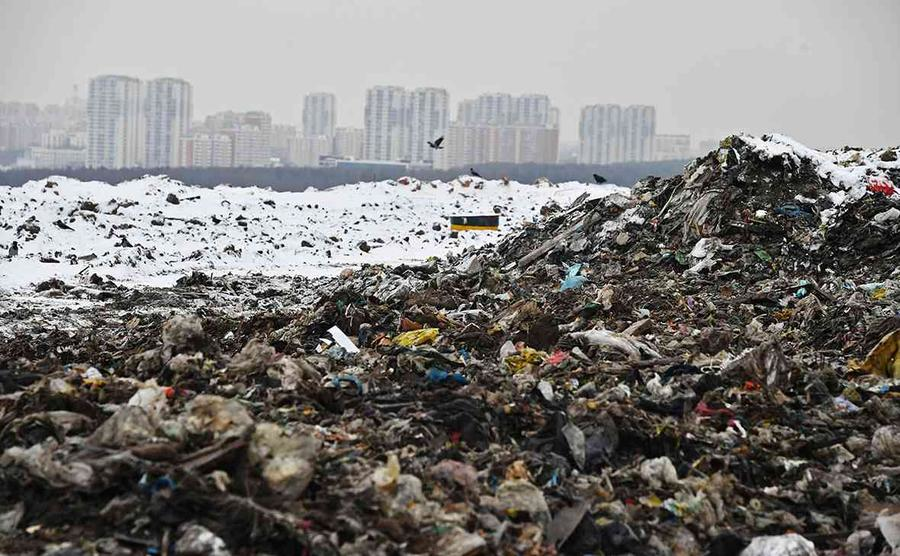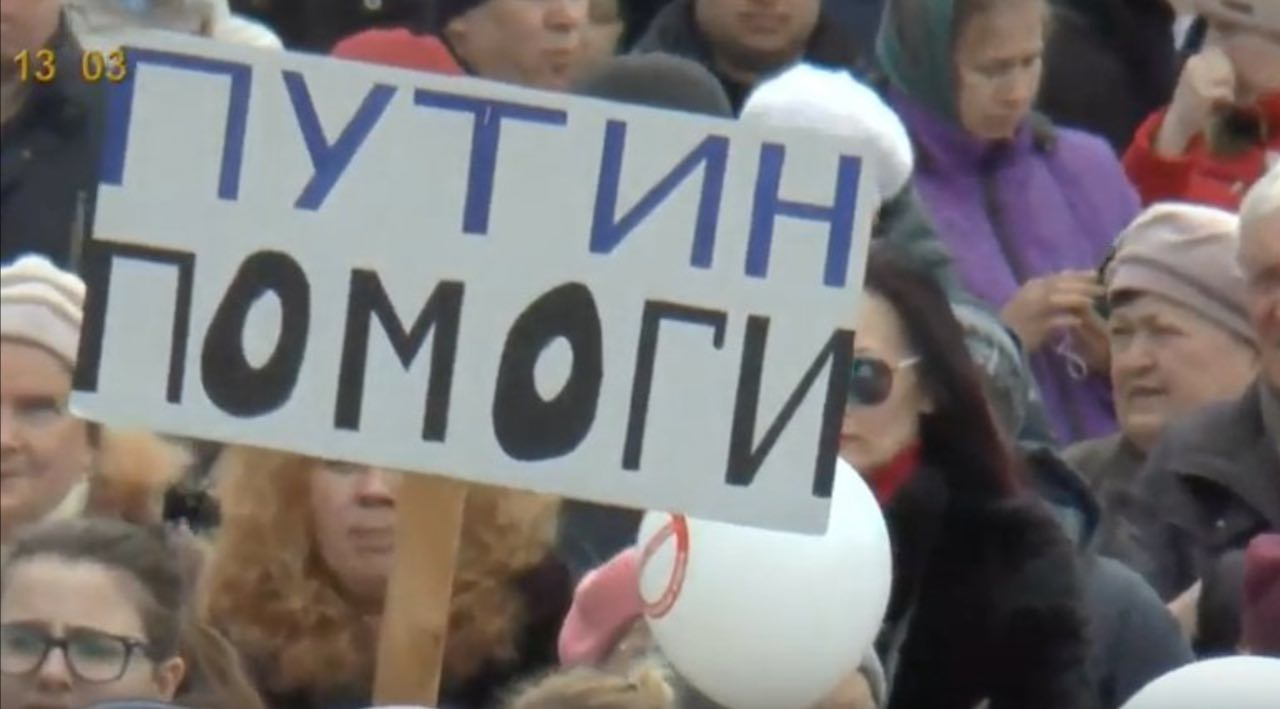Residents of Volokolamsk, a town 129 kilometers (80 miles) northwest of Moscow, have long complained about the stench coming from the nearby Yadrovo landfill where hundreds of garbage trucks from Moscow and the surrounding areas dump their loads every day.
On March 21, 2018, dozens of school children in the area fell ill and required medical attention, due to the air pollution leaked from the garbage dump.
Pyotr Lazarev, the mayor of Volokolamsk, told Current Time TV (the channel of Radio Free Europe/Liberty) that the children were rushed to hospital with gas-poisoning symptoms, including nausea, vomiting, bleeding noses, and fainting.
“The situation is very serious”, Lazarev said. “The children were taken to the clinic by ambulances. Parents are gathered near the hospital, demanding clear information on their children’s diagnoses. Doctors say it is poisoning.”
Adults also complained of nausea, fainting and breathing troubles.
The health risk was exacerbated by melting snow that could lead to dangerous chemicals getting into the local river.
On April 1, more than 7,000 Volokolamsk residents gathered at the rally against the dump, more than a third of the 20,000 people who live in the town.

The rally in Volokolamsk. Placards: “Vololokolamsk is the town of trash fame.” “Let’s tell no to the trash genocide!”
Residents of many other towns near Moscow have reported similar troubles from their own landfills. Residents from the historic town of Kolomna warn that their children are also suffering from health troubles and protesters there have tried to block garbage trucks from entering the local waste compound. It is located about 100 kilometers (60 miles) from Russia’s capital. Residents of Tarusa, Klin, Tuchkovo, Voskresenks and Naro-Fominsk — all townships located in the vast Moskovskaya Oblast — have also staged demonstrations or set up roadblocks.
Residents protest not only against existing landfills, but also against the construction of new ones. Part of the landfills are promised to be closed, but new ones are planned next to some of the remaining ones, the capacity of which can be even greater. For example, the capacity of the Yadrovo landfill in Volokolamsk, that started the protests and which the authorities now promised to close, is 430,000 tons per year. But from 2020 the “modernized” Yadrovo landfill is planned to receive 600,000 tons of waste.
The protests are growing and Russian media keeps discussing the problem.
One of the most popular Russian newspapers Vedomosty published an article entitled:
“Why the Moscow region suffocates from stink from landfills? –
The authorities were ignoring the garbage issue for a long time, and now there is almost no place to take waste.”
Alexander Kogan, the Minister of Ecology and Nature Management of the Moscow region told to Vedomosty:
“The Moscow suburbs experience a colossal garbage load. Twenty per-cent of the country’s waste is buried in the region. This amounts to 7.92 million tons of solid household waste from Moscow and 3.8 million tons from the region.”
Twenty-four landfills have been closed in the region over a few years, the remaining part of the garbage is taken to the remaining fifteen. According to the regional Ministry of Ecology, their capacities will last a maximum of two years. Last year, the Kuchino landfills near Balashikha were closed on the personal order of Russian President Vladimir Putin. During a TV direct line with him, the residents of Balashikha complained of constant fires in the dump and inaction by the authorities. The authorities were ordered to close the old landfill. All garbage had to be taken to the remaining landfills.
A year ago Alexander Kogan told the press: “If we do not start building a new waste management infrastructure today, in a few years we will simply have nowhere to put the garbage”.
The new infrastructure is still at the stage of discussions.
Why?
There are several ways to utilize solid waste. Garbage is transported to landfills mostly in developing countries. In Russia 95% of waste is buried at landfills; in Sweden – only 1%.
The most common way to deal with garbage in Europe is incineration. For example, in Sweden, 50% of the waste after sorting is burned to generate energy. There are more than 30 incineration plants in the country.
About a third of the waste in Western Europe is recycled.
Germany directs 66% of the waste for recycling and composting, the rest is turned into electricity and only 1% goes to landfills.
In 2014, the United States generated about 258 million tons of the waste. Over 89 million tons of the waste (34.6%) was recycled and composted. In addition, over 33 million tons of the waste was incinerated and 136 million tons were landfilled.
In order to start recycling and incineration, it is necessary to introduce separate garbage collection. Organic waste can be collected separately and processed into compost. But not all the Russian experts agree that the separate collection of garbage is a panacea for Russia.
Muscovites predominantly live in high-rise buildings with small flats and tiny kitchens. It is almost impossible to organize several containers for garbage in a 5-6 square meter kitchen. In addition, each type of garbage should be transported by different vehicles, that is, instead of one garbage truck, four will drive through the permanently jammed Moscow streets. This all must be analyzed, but no calculations have yet been made.
Residents are against the construction of incineration plants in their districts, they do not consider plants to be safe and environmentally friendly. That is why the authorities near Moscow have had difficulty in finding and agreeing on incinerator placements. Three years have passed since the decision for building the plants was made, but still none have come on line.
The first plants will not be working until 2021. With a maximum load, they will be able to process about 2.8 million tons of waste. Taking into account the growing volumes of waste, the plants will meet a fifth of what is required. What will be done with the rest of the rubbish?
The expert on the waste problem Dmitry Kolganov pointed out to Vedomosty: “We must understand that new landfills will still have to be opened. ”
Vedomostycame to conclusion: “Dumps have become a problem for the Kremlin.”



